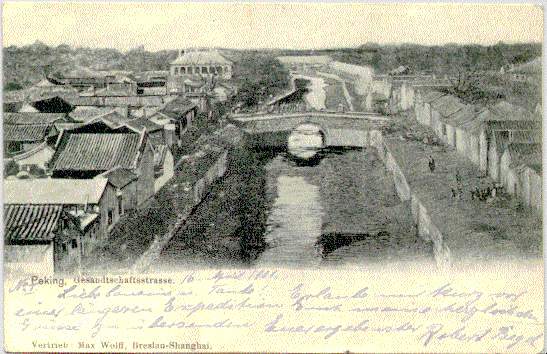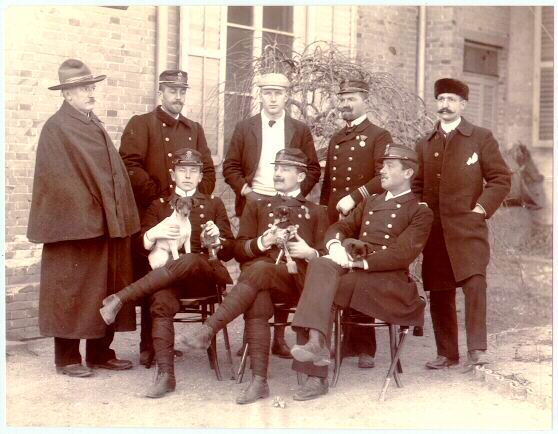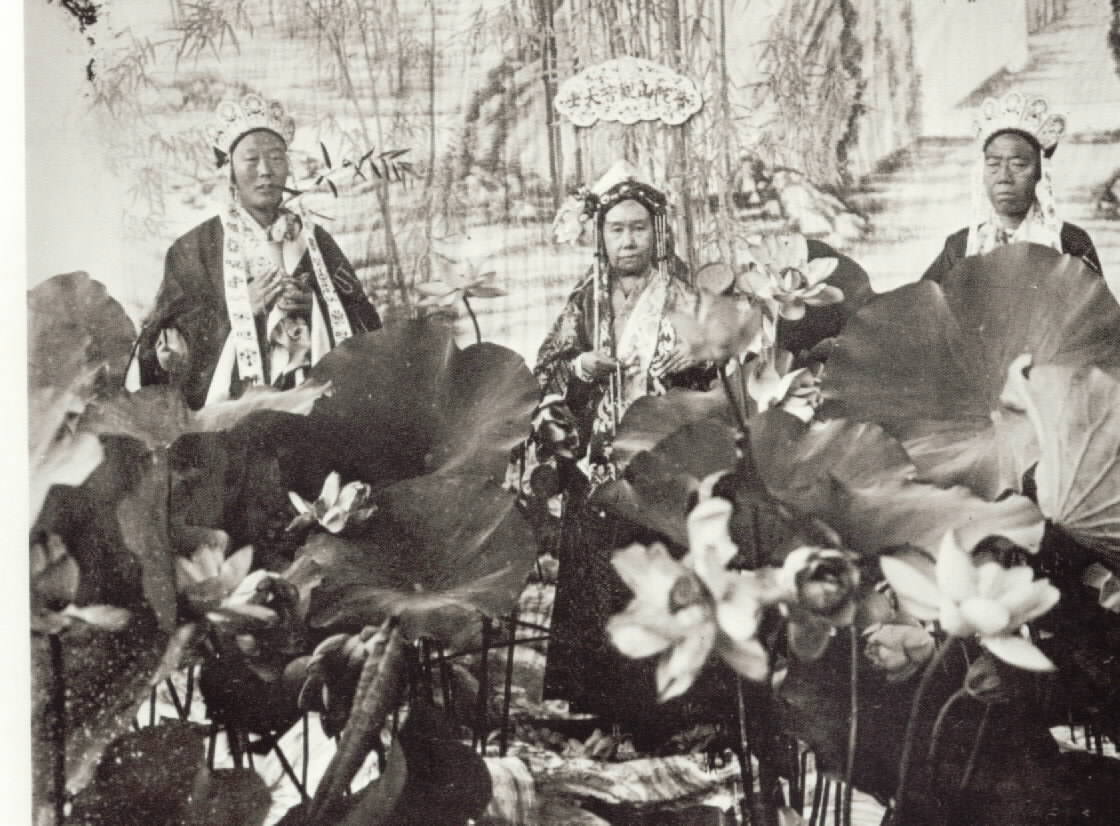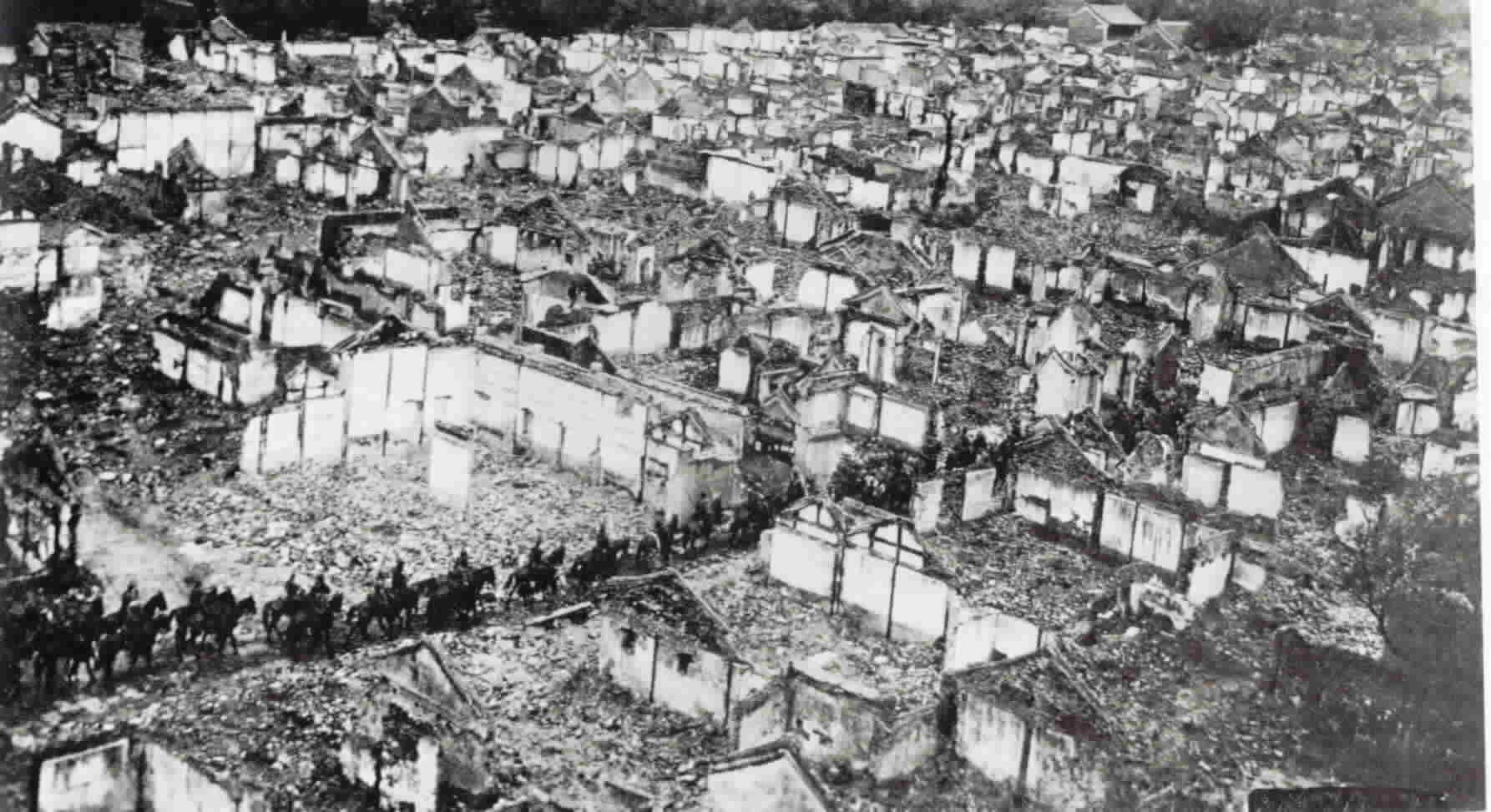The Boxers were a secret Chinese society bent on driving the "foreign
devils" out once and for all. No one seems to know the exact origin of
the Boxers (I Ho Ch'uan, which means Righteous Harmonious Fists); the translation
by Americans came to be known as the "boxers" (http://www.boondocksnet.com/china/.)
They may have originated in the 1700s, because Jesuit missionaries were
expelled in 1747 due to Boxer influence. Why the Boxers in 1900 were able
to garner so much influence has never been answered.
The rise in Boxer support could be attributed to the amount of imperial
support for the movement. Most notably, support came from Prince Tuan and
to a certain extent, the Dowager Empress, Tzu Hsi. This "unofficial" imperial
support of the Boxer society was not the only contribution. China had recently
suffered natural disasters as well as military, political, and economic
sanctions placed on them by the Western powers. China was defeated in 1894-1895
by Japan, with Japan emerging as the most powerful of the Asian powers.
The Boxer Rebellion of 1899-1900 is tied into a complex system of conflicts
between China and the outer world, between the central government and the
regions, between the peasants and elite. All of these conflicts compounded
each other, even though the Boxer Rebellion started in Shangdong as a movement
against foreigners and foreign influence in China, especially against the
presence of Christian missionaries. In the late 1850s missionaries were
rather free in their activities inside China, but conflicts arose in Shandong
when in 1897 two missionaries were killed, and the German government in
turn used this as an excuse to occupy the Kiaochow Bay in order to build
a German city there (Purcell, 67-81). Russia demanded and subsequently
received a lease on the ports of Port Arthur and Darien, Britain obtained
Wei-Hai-Wei, and France seized Kwangchowwan. Additionally, the completion
of the Tientsin-Peking railroad put thousands of Chinese workers out of
work. The subsequent removal of Chinese territories in the hands
of foreigners, the degredation they felt over the slights imposed by the
foreign class, as well as the drastically increasing influence of foreign
powers in Chinese culture sparked the way for a rebellion to be accepted
by the people of China.
The Boxers believed that they had been made invulnerable by sorcery
and incantation, and they began to win recruits late in 1899. Their beliefs
of resisting Europeanization to preserve the purity of the soul of China
was soon translated into a message of death to the "foreign devils" and
their collaborators. As Chinese people began to turn to these secret
societies, which had always preached hatred of the western foreigners,
the Boxers began to emerge between 1898 and 1899 from the underground and
to preach in the open. The Chinese government’s stance was initially anti-Boxer,
but eventually officials openly supported the movement. Military commanders
and governors who were anti-Boxer were removed from command and replaced
with pro-Boxers. Without restraining leadership or organization,
in early 1900 the Boxer’s began to raid outposts and symbols of western
influence, including missions. The attacks were gruesome. Men and women
were hacked to death with swords, burned alive in their compounds.
Sometimes they were dragged and tortured through howling mobs before their
execution, after which their severed heads were displayed in cages on village
gates. Between 1898 and 1899, the Boxers focused on attacking Chinese Christians,
but on December 30, 1899, they killed a British missionary (Esherick, 269-270).
The British and German governments immediately issued strong protests,
resulting in the execution of two Boxers and the imprisonment of a third.
The situation continued to worsen in early 1900, until the Dowager Empress
released an imperial edict which stated that secret societies were part
of Chinese culture and, therefore, were not criminal.
In the spring of 1900, the Boxers were out of control killing seventy
Chinese Christians and inciting riots throughout Peking. On May 29, 1900,
two British missionaries were attacked and one was killed (Sharf and Harrington,
25-30). The foreign ministers in Peking issued strong protests, and the
British diplomats informed the Chinese that they had twenty-four hours
to put down the Boxers or troops from the coast would be called in to quell
the rioting. Foreign governments immediately demanded that the Empress
Tz’u-hsi gain control over this murderous society. But the imperial court
was dominated by anti-foreign attitudes that wished to throw off the imperialistic
Western powers that, in their opinion, threatened the Chinese way of life.
This attitude dominated the government, the Boxers were not outlawed; rather
the society launched further attacks with government approval. Churches
were burned, offices destroyed, and diplomatic officials murdered. By mid-June,
foreigners and Chinese Christian converts were held in a small quarter
of Peking, while the countryside was at the mercy of the Boxers as they
slaughtered any suspected Christians. Before the Chinese government could
reply, the diplomats learned that the telegraph line between Peking and
Pao Ting Fu had been cut. The foreign diplomats ordered troops up from
the coast, but the efforts were halted by the Chinese. On May 31, the troops
were allowed to advance into Peking. Three hundred and forty troops arrived
in Peking that night, followed by another ninety troops four days later.
 (British
Legation Quarters in Peking 1901) (British
Legation Quarters in Peking 1901)
On June 9, 1900, the first of many Boxer attacks occurred against foreign
property in Peking: the racecourse was burned down. Sir Claude MacDonald,
the British minister to Peking along with many other foreign ministers
wasting no time in lodging a protest with the Chinese government. Sir Claude
also wired Admiral Seymour at the coast to begin moving a sizeable relief
expedition up to Peking. By June 10th it was quite clear to the foreign
citizens in the Legation Quarter that
they would be the next targets of the Boxers. The Boxers cut the telegraph
line to Tientsin, stopped the mail service, collaborated with Chinese Imperial
Troops, and mounted artillery on the city walls that faced the Legation
Quarter. Additionally, Prince Tuan the new head of the Tsungli Yamen (Chinese
Foreign Office) was announced on June 10th was a noted Boxer supporter
(Sharf, 25-30).
The situation worsened the next day, when the Japanese minister was
murdered while he was on his way to greet the expected Seymour relief column.
The foreign ministers protested to the Chinese government, but the Chinese
said that it was the work of bandits and ruffians. The foreign citizens
and Chinese converts now fled to the two remaining centers of Western control
in Peking, the Legation Quarter and Pei T'ang Cathedral. The foreign ministers
had been unable to convince Bishop Favier, head of the Pei T'ang Catherdral,
to leave and come to the Legation Quarter. However, they did send
43 French and Italian sailors to defend the Cathedral.
By June 16th, Westerners and Chinese converts were in either the Legation
Quarter or the Pei T'ang Cathedral. On this day the Boxers set fire
to a large area of Peking. After the fire had been put out, there were
two very tense but uneventful days. Then on June 19th, the Chinese Foreign
Office sent an ultimatum to the Legations. The ultimatum stated that the
foreigners should evacuate Peking within twenty-four hours because the
Chinese government could no longer guarantee their safety. They offered
the foreigners safe conduct to Tientsin on the morning of June 20th (http://www.top-education.com).
All of the foreign ministers agreed that they should not move, and they
decided to buy some time by requesting an audience with the Chinese Foreign
Minister. They received no reply from the Foreign Office and the German
minister, Baron von Ketteler, decided to seek the minister in person. He
left the Legations in two sedan chairs accompanied by an interpreter. Not
far from the Legations an imperial soldier stepped in Ketteler's path and
killed him, and the interpreter fled and spread the news of his death.
The revolt would not last. An international relief force of some nine
thousand soldiers, under the direction of the United States as well as
all of the major European powers fought its way inland from the coast.
On August 14, 1900, after Empress Tz’u-hsi fled the capital, the siege
was lifted. The world cheered as civilization was restored, but it was
hardly an enlightened ending. The foreign troops began widespread looting
of Peking and the surrounding territories in pursuit of the Boxers (http://www.mrdowling.com/613-boxer.html).
Many more Chinese civilians died due to the gunfire of both sides. While
the number of European and American loses were not small, the number of
Chinese Christian converts causalities numbered much higher, at more than
30,000.
In June 1900, Britain, Russia, Japan, the United States, Germany, France,
Italy, and Austria combined forces, and suffered initial defeats. However,
a relief expedition consisting of British, French, Japanese, Russian, German,
and American troops relieved the besieged quarter and occupied Beijing
(Peking) on Aug. 14, 1900. The US suffered 53 dead and 253 wounded in the
rebellion. The relief forces retained possession of the city until a peace
treaty was signed on September 7th, 1901. The terms of the treaty stated
the Chinese were required to pay, over a period of 40 years, an indemnity
of $333 million (http://www.regiments.org/milhist/wars/19thcent/00china.htm).
Other treaty provisions included commercial concessions and the right to
station foreign troops to guard the legations in Peking, as well as maintain
a clear corridor from Beijing to the coast. The Middle Kingdom was not
under de facto colonial rule. Despite U.S. efforts to stop further territorial
encroachment, Russia extended its sphere of influence in Manchuria during
the rebellion.
 (Foreign
Troops relaxing outside their embassy in 1901) (Foreign
Troops relaxing outside their embassy in 1901)
In 1901, China was forced into virtual disarmament and fined 333 million
in reparations (which over the next forty years would double with interest)
as the official punishment for the rebellion and the loses suffered. The
cost of the Boxer rebellion, to the Chinese, was more than monetary; loses
included the collateral damage of thousands of innocent lives, territorial
loss, loss of national pride, and an even greater loss of control over
the country.
In the Boxers’ protocol signed on September 7, 1901 by eleven foreign
countries, China had to pay a high price for the 229 foreigners who lost
their lives during the rebellion. The government had to punish the
Boxers severely, suppress any signs of militant xenophobia, allow foreign
troops to be stationed at every important junction between Peking and Shanghai,
and pay the aforementioned reparations. Although in the following decades
this sum was never fully paid, an estimated 669 million taels were transferred
from China to the foreign countries involved until the late 1930s. Some
of the finest libraries and research institutes concentrating on China
and Chinese history and Chinese culture were built outside China during
these years due to the "Boxer indemnities."
|
 “For the past thirty years the foreigners have
taken advantage of our country's benevolence and generosity as well as
our wholehearted conciliation to give free reign to their unscrupulous
ambitions. They have oppressed our state, encroached upon our territory,
trampled upon our people, and exacted our wealth. Every concession
made by the Court has caused them day-by-day to rely more upon violence
until they shrink from nothing. In small matters they oppress peaceful
people; in large matters they insult what is divine and holy. All the people
of our community are so full of anger and grievances that every one desires
to take vengeance”
“For the past thirty years the foreigners have
taken advantage of our country's benevolence and generosity as well as
our wholehearted conciliation to give free reign to their unscrupulous
ambitions. They have oppressed our state, encroached upon our territory,
trampled upon our people, and exacted our wealth. Every concession
made by the Court has caused them day-by-day to rely more upon violence
until they shrink from nothing. In small matters they oppress peaceful
people; in large matters they insult what is divine and holy. All the people
of our community are so full of anger and grievances that every one desires
to take vengeance”

 (British
Legation Quarters in Peking 1901)
(British
Legation Quarters in Peking 1901)
 (Foreign
Troops relaxing outside their embassy in 1901)
(Foreign
Troops relaxing outside their embassy in 1901)